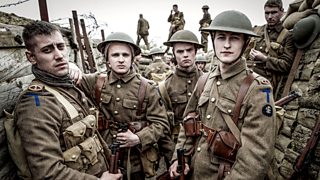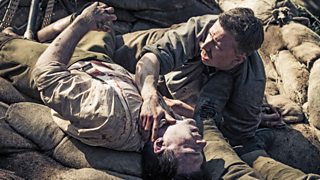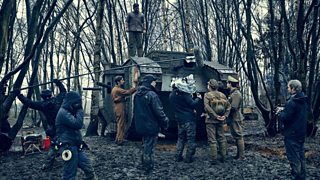Editor’s Note: Inspired by the BAFTA-winning series , which tracked the first-hand experiences of British troops on the front line in Afghanistan, immerses viewers in the real stories of British troops serving on the front line during World War One. Our World War is written by Joe Barton and starts on ±«Óãtv three on Thursday 7th Aug at 9pm. The series has been made in association with .

The plan for was to take the formula of ; a BAFTA winning documentary series that used self-shot footage of young soldiers to provide an insight into life for British troops in Afghanistan, and apply it to the First World War.
With any factual piece, research is key. Although I was hopeful going into this that my experience of watching Band of Brothers all the way through several times would be enough, it quickly became apparent there was much to learn. How many men are in a company? How many companies in a division? Is a Captain more important than a Lieutenant? How do you spell Colonel?! All these questions and more required answering. In this respect I was helped (and, subsequently, ruined for future projects) by the fact that a whole year’s worth of research had already been done for me by the ±«Óãtv, instantly making a lifetime of diligent licence fee payments absolutely worth it. The basic ideas for the episodes were in place – would be about Britain’s first battle of the war, Mons. would follow a young volunteer from Manchester named Paddy Kennedy, and episode three would be about a tank crew fighting in the battle of Amiens. Each had its challenges. There were hard-cast facts that we wanted to put on screen, but each episode needed to be given a structure and driven through with the kind of dramatic beats that real life sometimes didn’t provide. In this respect episodes two and three, whose stories stretch over much longer periods of time that the 24 hours depicted in episode one, were the trickiest. We had to fight harder to provide a satisfying dramatic narrative whilst remaining true to the real-life soldiers (and the ever-watchful eye of the ±«Óãtv factual department). Men who, in real life, probably never met, were re-cast as good friends, possible doomed romances with girls back home were invented, no nonsense captains were imagined up, but all of them served a factual spine that had grown from the letters and memoirs of the real soldiers whose stories we were telling.
Watch the trail for Our World War
The producers checked with the families of all of the men whose lives we dramatized, making sure they were happy both before and after the films were made. Everyone’s been really on-board with the project and understanding of the realities of adapting their relative’s lives to screen. Private Paddy Kennedy’s daughter was pleased to have us tell his story and only had one stipulation – that we didn’t make him a Tory…
In the process of researching the piece I discovered something about my own family history. My great uncle, Henry E. Atkinson, had been a soldier when the war broke out, and was in fact stationed with the 1st Lincolns just outside of Mons when the fighting began. He would fight on until 1915 when, as the War Office wrote to inform his mother, in a letter cruel with brevity and implied horror, he died of ‘wounds’ in a German Prisoner of War camp. Last year the Courts and Tribunals Service released thousands of letters and wills from British soldiers that had been censored and never delivered. I looked to see if any of our characters were amongst them, they weren’t, but by chance my great uncle was, and a letter he’d written shortly before his death finally, a hundred years late, found its way home to his family. My Grandfather lived to be 94, and to his dying day he never failed to be reduced to tears recounting the time his brother came to say goodbye to him at the school gates before he went off to France, never to be seen again. The idea of my great uncle’s letter to his mother and siblings being kept back from them was heart breaking, and this idea became a foundation for the series, of which soldier’s correspondence and memories were so important. In episode three, Private Chas Rowland finds a letter on the body of a dead soldier and decides to deliver it home safely. Chas is real, the letter and soldier are fictional, but inspired by my great uncle. Similarly, I used large parts of my great uncle’s letter as basis for a letter home from the real-life character of Henry Delaney in episode two, which is drawn from the extensive written memories of Private Paddy Kennedy. It’s a hodge-podge of facts and drama but hopefully one that respectfully provides some insight and truth into the men’s stories and their experiences of war.

Private Sid Godley (THEO BARKLEM BIGGS), Maurice Dease (DOMINIC THORBURN)
One of the things we wanted to do with Our World War was create something that would appeal to a younger audience who perhaps wouldn’t be tuning in to other centenary dramas or documentaries. One of the core ideas for me was that we’ve spent the last ten years or so sending young men and women to fight and die overseas in a war many people have since struggled to understand and defend. A hundred years ago we did much the same (though that’s about as far as the WW1/Afghanistan/Iraq comparisons should probably go). The fact is there are still lessons to be learnt from the First World War and it’s important that they’re not just learnt by people who read Max Hastings books and watch Jeremy Paxman documentaries.
To speak to this audience we wanted to make a World War One drama unlike any other, with a look and feel that was truly unique for this conflict. To do this we took filming techniques based on the immediate, documentary, style of Our War, we used contemporary songs on the soundtrack, and tried to inject the characters with as much life as possible. Too often it seems like World War One is presented as staid and ornate. It feels like sometimes programme makers treat ‘being in World War One’ as a character trait in and of itself. The fact is many of the characters are kids, and, yes, they existed before various sexual and cultural revolutions gave birth to the concept of ‘teenagers’, but they were still young men, fighting a war, stuck together. They needed to feel like young people today, not sepia toned relics of some distant past. A bit of a short cut to this is the language, notably the cursing (which is factually accurate). We had a ‘swear check’ before filming to make sure the ±«Óãtv was happy. This involved a long conversation with me and one of the producers, who was sat on a bus at the time whispering obscenities furtively into his phone, checking how key to my creative vision they were (answer: pretty f**king very).

Cast and crew with the tank on location.
We wanted to make it a realistic depiction of what it must have been like back then, but we didn’t want to be grandiose about it. There’s an argument that it’s almost impossible to put combat on screen without glamourizing it, even unintentionally. Everything about the medium of TV and film; the camera angles, the music, the sound effects, choreography and stunt work, all of it makes it exciting and can, if you’re not careful, make it look a little bit too much like fun. It was important to us not to be overly nationalistic, overly chest beating. World War One was a global tragedy, a class based war that became a meat grinder for an entire generation of young men. We wanted to commemorate, not celebrate, and hopefully help people – the sort of people who, a hundred years ago, might have been sent to fight and die themselves – to understand just what it was like for those who were there.
Ìý
.
